New Year’s singing – Kalanda
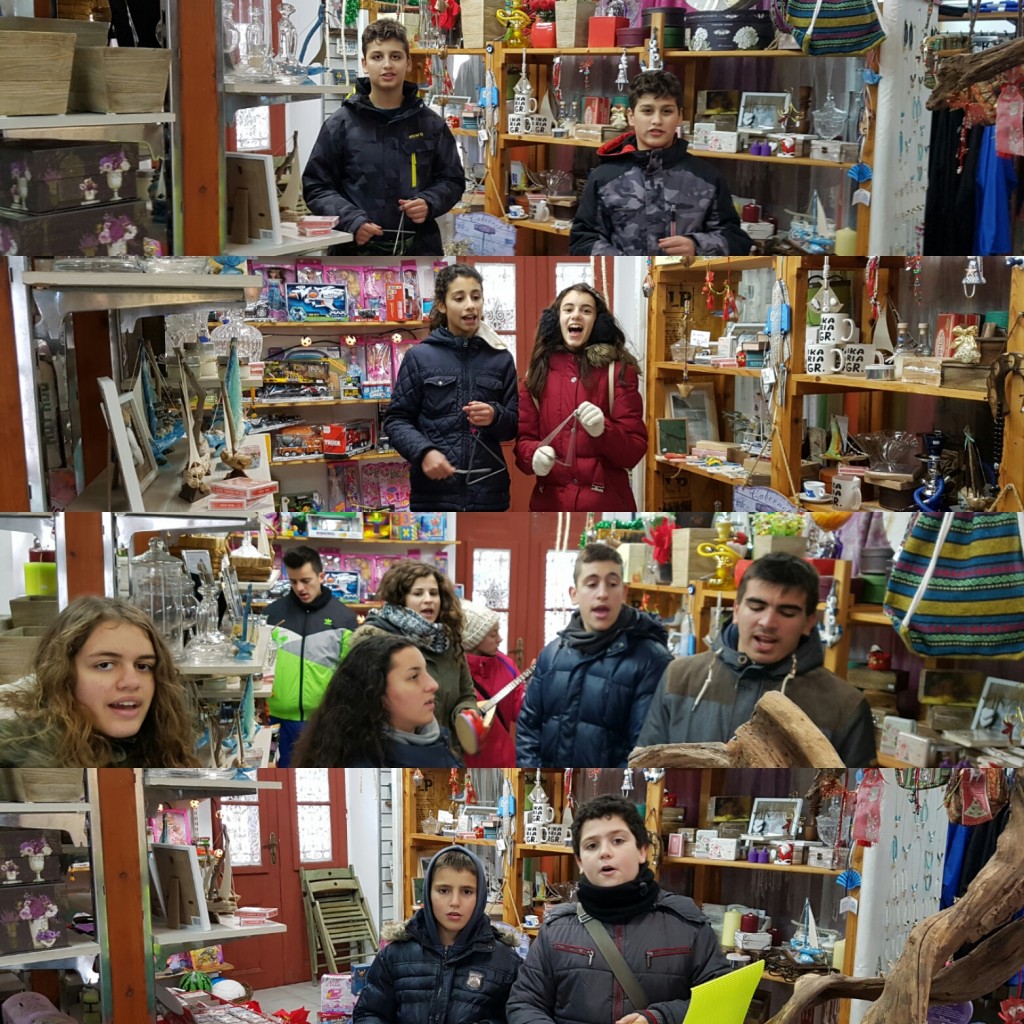
It’s time for a repost again: The New Year’s Kalanda. I am often asked: what is it actually like to live in Ikaria in winter? The Kalanda are a good example of our village’s unbroken joy of life and sense of community.
Kalanda is the traditional holiday song in Greece. Most notably, they are sung on December 24th and 31st by children who go from house to house to wish good luck. As they enter, they wish: “Chronia polla!” (Long live!). After the question: Na ta pume? (“Shall we perform?”) they begin, accompanied by clattering triangles, sometimes also by flutes and small hand drums. In return they receive candy and a few coins.
A special day, January 1st
The first of January is a very special day in my village, in Ag. Dimitrios. The tables are set and the houses are opened so that the whole village can celebrate the first anniversary together, come into the houses and wish the owners a happy new year. “Na ta pume?” (Shall we sing for you?) is always asked when entering with many good wishes and then the Kalanda is sung. “Kali chronia!” (a good year!) is what you wish for.
Unfortunately, the Kalanda will not take place this year due to two tragic deaths in my village. This means that some families are in mourning and the others do not want to carry the pure joy through the village and celebrate out of compassion. All families will celebrate this first January quietly at home and, in a small setting, cut the Vasilopita, the New Year’s cake with the lucky coin. But I still don’t want to keep Peter’s impressive report from you. Even though his first Kalanda was written a few years ago, his description is still current and captures the atmosphere wonderfully.
Χρόνια πολλά! Καλή χρονιά! Happy New Year!
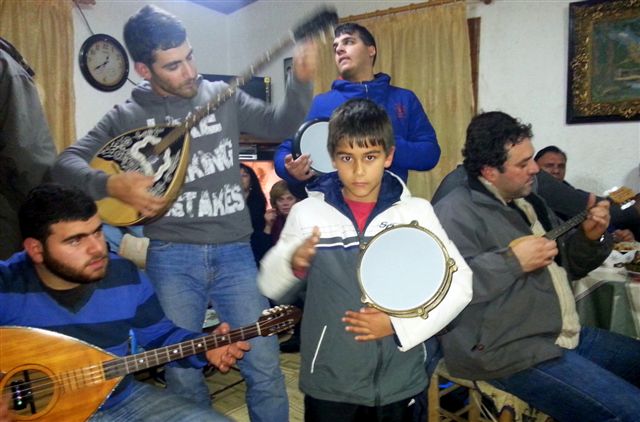
New Year’s message “insulae et amicis” A letter to friends written on January 1st, 2013 by Peter Rütten, Ikaria-Germany
Whose heart is full… And it is still so full that I have to be careful that my mouth doesn’t overflow too freely; because what we experienced here on New Year’s Day was so extraordinary that it (along with our enthusiasm) might seem unbelievable. So you can safely deduct a few percent for old age sentimentality and Hellenophilia; the rest is still worth mentioning!
In advance of the event to be described, I had already prepared a flippant six-liner, which you will of course not be spared:
On New Year’s Day we strive out;
then you move from house to house,
takes a bite here, a glass there,
sings, dances and also plays his jokes,
until man and woman are full and happy – then the whole village is blue.
But then came New Year’s Day itself. Friends had invited us to take part in the most important event of the local festival year, and so at around 1 p.m. we met with many residents of the village of Agios Dimitrios in the community hall, where the Pope, after unctuous words and songs, blessed the huge New Year’s bread, which was then distributed. Children received small gifts; Music was played and New Year’s songs were sung.
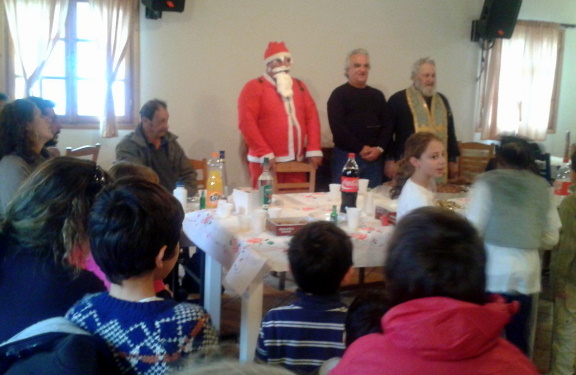
After this opening ceremony, the New Year celebrations began, in which a large part of the residents took part. For this purpose, the houses were open and people moved from one to the other according to a time and route plan that was unclear to us. When they arrived at each house, the musicians who accompanied them struck up a traditional song with many verses and everyone sang along loudly and joyfully. We barely understood the text, but it was explained to us that it was a cheerful, mocking verse that was adapted to the situation and the respective hosts and expanded through joyful improvisation.
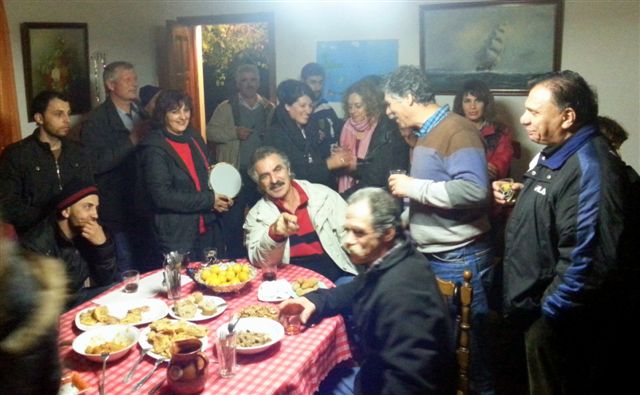
In each of the houses the tables were lavishly set with small delicacies and there was also plenty of home-made wine. At the end we danced and after about twenty minutes we moved on to the next house. You have to know that in Agios Dimitios the houses do not gather around the church as in our villages, but are widely scattered in oil and orchards in rugged terrain, so that larger distances often had to be overcome.
Unfortunately, we neglected to count, but we estimate that we were guests in at least forty houses over the course of the afternoon and night. After their visitation, the residents of the house themselves moved with them, so that the procession became longer and longer and towards the end there was only room for a smaller number in the apartments; but those who had to stay outside the door were still cared for from inside and enjoyed themselves in their own way. At some point Marlies was no longer able to stand on her feet, but the writer held out until four in the morning, after which he found it difficult to fall asleep because of his emotional exuberance and neither he nor the village were, as falsely assumed, “blue”.
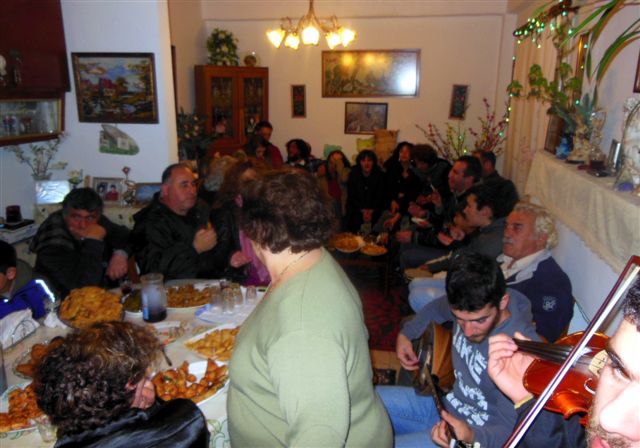
It is noteworthy that, in addition to the expected older Greeks, many young people and children also took part in the procession until the early hours of the morning and that some of the hosts were among the highly revered nonagenarians and centenarians, who are not exactly rare on the island (see Blue Zones). The size and furnishings of the houses also ranged from the poor kitchen-living room to the comparatively spacious and lavishly furnished villa.
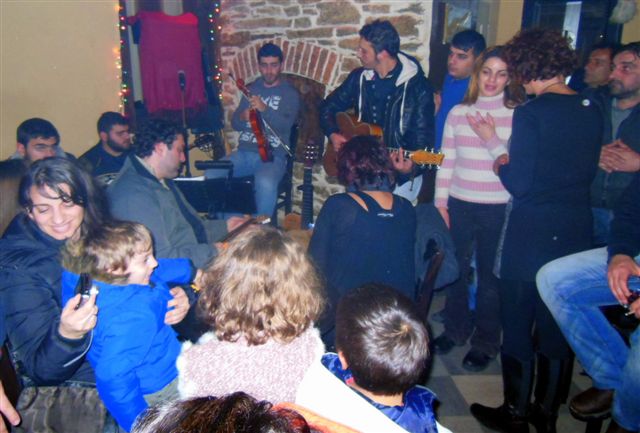
The custom described also exists in other villages in Ikaria, but there people probably only visit each other within defined circles of family and friends. The fact that all villagers participate in such an egalitarian manner is a special feature of Agios Dimitrios, and its residents are rightly very proud of this annual confirmation of their community. We had the impression that this time they also used it to defiantly and proudly assert themselves in a time of crisis. And despite all the blatant antipathy towards Merkel, we were met as Ξένοι (Kseni, strangers) in an extremely friendly and unprejudiced manner.
Over the course of these many hours, we repeatedly asked ourselves the rhetorical question of whether an analogous event would also be conceivable on German soil!? Please contradict us if you can. Otherwise, talk about it to all the idiots who want to show the Greeks how to live. It’s best to add it to your list of good resolutions for the New Year! In the meantime, we warmly greet you, Marlies and Peter.
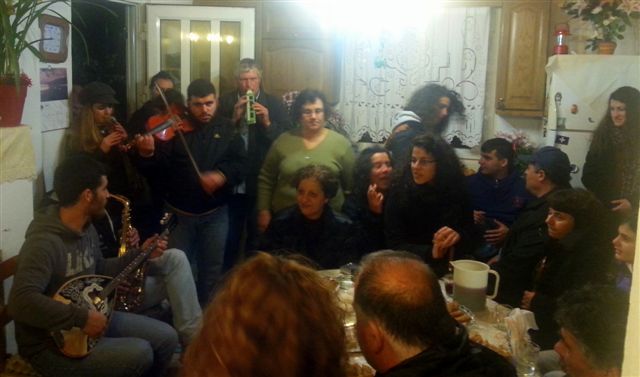
Ursula’s note: The houses will be opened so that the whole village can celebrate the first anniversary together. Everyone is fed hospitably. Every house cooks for two days just for this occasion, and the housewives give their all because of course they only want to serve the best. The traditional songs call each family member by name and glorify each family member one by one, father, mother, daughter, son, etc. It refers to the strength of the foundations of the house and to the well-being of the family, to its health, to its future, depending on whether their wedding or a future child was drunk and also lovingly cynically alluded to. Always with the refrain…
Βάλτε μας κρασί να πιούμε! και του χρόνου να σας πούμε!!!!
(Valte mas krasi na piume! Kai tu chronu na sas pume!)
Give us wine to drink! So that we can sing to your health again next year!
Video Kalanta in Agios Dimitrios Raches Ikaria 1.1.2013 from the radio station Ikaria
Photos Kalanta Agios Dimitrios Raches Ikaria January 1, 2013 from the radio station Ikaria
My heartfelt thanks to Marlies and Peter for making this letter available to me! I couldn’t have captured the atmosphere better!
